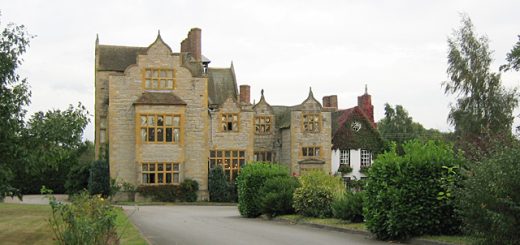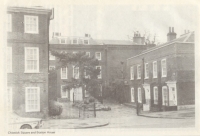The Christopher Inn and Captain William Dyke
An apparition is thought to have been experienced in the Christopher Inn, Windsor. The Inn dated from the 16th century and could be found next to the college on Baldwin’s Bridge. This inn was closed on the order of the Head of Eton College in the mid 19th century due to its poor reputation.
According to A History of the County of Buckingham: Volume 3 (1925) ‘The Christopher Inn, which stood in Eton until well into the 19th century and of which the name is still preserved in the modern hotel in the High Street, dated certainly from the 16th century, the earliest mentions of it being found in 1546 and 1548. A survey of 1650 states that it was built part with brick and part with timber and Flemish walls, consisting of one hall, a parlour half wainscoted and floored with deal boards, one milk-house, one tailor’s shop and under the same one cellar and behind the same one kitchen, one small buttery; also three stables whereof one stable is lofted over and fitted with four lodging chambers and the other two stables lofted over and over the other rooms, a gatehouse, eight lodging chambers and at the back end of the aforesaid stables one long ‘shead standing cross and mounded,’ the courtyard used for the strawhouse, and near unto these adjoining one barn, strongly built with timber and covered with tiles and thereunto belonging one shed now used as a woodhouse, the ground whereon the said houses stand, together with the courtyard, ground and backsides containing by estimation one acre and worth £10 per annum.
The ‘ever memorable’ John Hales lodged next to the ‘Christopher’ in 1656, and among the celebrities who visited the inn was Horace Walpole, who writes from there in August 1746, ‘Lord ! how great I used to think anybody just landed at the “Christopher !” ‘
The inn was frequently leased to the college, but in 1845, after it had been finally acquired from the Crown by the college authorities, Dr. Hawtrey, then head master, strongly urged that no lease of it should be made, inasmuch as the inn was the cause of much evil and temptation among the boys. It was given up to one of the masters, the condition being made that the tenant must accommodate a certain number of king’s scholars in the event of plague breaking out in the college. Traces of the old building are still to be seen.
The apparition appeared to Captain William Dyke and the following account was published in ‘The Haunted Homes and Family Traditions of Great Britain’ by John Ingram (1897) ‘Several writers of a past generation, including Joseph Glanvill, were fond of relating the story of Major Sydenham and his friend, Captain William Dyke, but it appears to have escaped the researches of modern commentators on the Supernatural. Shortly after the death of Major Sydenham, Dr. Thomas Dyke called on his cousin, Captain William Dyke, of Skilgate, in the county of Somersetshire, and agreed to pass the night with him. At the captain’s request, Dr. Dyke agreed to sleep in the same bed with his cousin, but previous to composing himself to sleep, the Doctor was aroused by his companion calling up a servant and bidding the man bring him two of the largest candles he could obtain, and have them lighted.
The Doctor naturally inquired what these were intended for, to which the Captain answered: “You know, cousin, what disputes the Major and I have had touching the immortality of the soul, on which point we could never yet be resolved, though we so much desired it. And, therefore, it was at length fully agreed between us, that he who died first should, the third night after his funeral, between the hours of twelve and one, come to the little house which is here in the garden, and there give a full account touching these matters to the survivor, who should be sure to be present there at the set time, and so receive a full satisfaction. And this,” says the Captain, “is the very night, and I am come on purpose to my present lodging to fulfil my promise.”
The Doctor advised him not to follow strange counsels, for which he could have no warrant. The Captain replied, “that he had solemnly engaged,” and that nothing should discourage him ; and added, “that if the Doctor should wake awhile with him, he would shake him, if not, he might compose himself to rest ; but, for his own part, he was resolved to watch, that he might be sure to be present at the hour appointed.” To that purpose he set his watch by him, and as soon as he perceived that it was half an hour past eleven, he arose, and taking a candle in each hand, went out by a back door, of which he had before got the key, and walked into the garden house, where he continued two hours and a half. At his return he declared he had neither seen nor heard anything more than usual. “But I know,” said he, “that the Major would surely have come had he been able.”
About six weeks after, the Captain rode to Eton, to place his son a scholar there, when the Doctor went thither with him. They lodged at the sign of the “Christopher,” and tarried two or three nights, not lying together now, as before at Dulverton, but in two several chambers. The morning before they went away, the Captain stayed in his chamber longer than usual, before he called the Doctor. At length he came into the chamber, but with his body shaking and trembling. Where at the Doctor, wondering, presently demanded, “What is the matter?” The Captain replied, “I have seen the Major.” The Doctor seeming to smile, the Captain said, “If ever I saw him in my life, I saw him but now,” and then related to the Doctor what had passed. “This morning, after it was light,” said he, “one came to my bedside, and suddenly drawing back the curtains, called, ‘Captain! Captain!’ To whom I replied, ‘What, Major?’ To which he returned, ‘I could not come at the time appointed, but I am now come to tell you, That there is a God, and a very just and terrible one, and if you do not turn over a new leaf(the very expression the Doctor punctually remembered) you shall find it so.” The Captain proceeded : “On the table there lay a sword which the Major had formerly given me, and after the apparition had walked a turn or two about the chamber, he took up the sword, drew it, and finding it not so bright as it ought to be, cried, “Captain! Captain! this sword did not use to be kept after this manner when it was mine”. After which he presently disappeared.”
The Captain was not only thoroughly persuaded of the truth of what he had seen and heard, but was from that time observed to have become quite an altered man. And it was judged, by those who were well acquainted with his conversation, that the remembrance of this passage stuck close to him; and that those words of his dead friend were frequently sounding in his ears during the remainder of his life; which was something more than two years.




Recent Comments